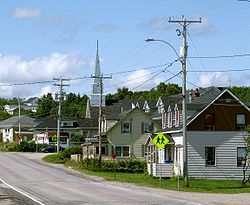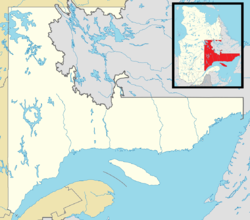Longue-Rive is a municipality located on the north shore of the maritime estuary of the St. Lawrence River, in Côte-Nord region, Quebec, Canada.
Longue-Rive | |
|---|---|
 Rue Principale in Sault-au-Mouton | |
 Location within La Haute-Côte-Nord RCM | |
| Coordinates: 48°33′N 69°15′W / 48.550°N 69.250°W[1] | |
| Country | Canada |
| Province | Quebec |
| Region | Côte-Nord |
| RCM | La Haute-Côte-Nord |
| Constituted | May 28, 1997 |
| Government | |
| • Mayor | Donald Perron |
| • Federal riding | Montmorency—Charlevoix —Haute-Côte-Nord |
| • Prov. riding | René-Lévesque |
| Area | |
| • Total | 321.18 km2 (124.01 sq mi) |
| • Land | 308.06 km2 (118.94 sq mi) |
| Population (2021)[3] | |
| • Total | 918 |
| • Density | 3.0/km2 (8/sq mi) |
| • Pop (2016-21) | |
| • Dwellings | 562 |
| Time zone | UTC−5 (EST) |
| • Summer (DST) | UTC−4 (EDT) |
| Postal code(s) | |
| Area code(s) | 418 and 581 |
| Highways | |
| Website | longuerive |
The municipality includes the communities of Sault-au-Mouton, Baie-des-Bacon, Pointe-à-Boisvert, Rivière-Éperlan and Saint-Paul-du-Nord.
History
editOn June 2, 1898, the Township Municipality of Saint-Paul de Mille-Vaches was formed when it split off from the Municipality of Escoumains. It changed statutes on July 4, 1931, to become the Municipality of Saint-Paul-du-Nord.[4]
On January 1, 1947, the Village Municipality of Sault-au Mouton was created when it separated from Saint-Paul-du-Nord.[5]
In May 1997, the Village Municipality of Sault-au-Mouton[6] and the Municipality of Saint-Paul-du-Nord[7] were merged into the new Municipality of Saint-Paul-du-Nord–Sault-au-Mouton.[8] The municipal council had 12 months to request for a name change, in consultation with its population. The new name Longue-Rive was chosen out of a list of 10 options through a referendum on May 26, 1998, and approved by the government on September 22, 1998. Longue-Rive (French for "long shore") refers to the municipality's location along the north shore of the maritime estuary of the St. Lawrence River.[1]
Demographics
edit| Year | Pop. | ±% |
|---|---|---|
| 2001 | 1,352 | — |
| 2006 | 1,259 | −6.9% |
| 2011 | 1,113 | −11.6% |
| 2016 | 1,026 | −7.8% |
| 2021 | 918 | −10.5% |
| Source: Statistics Canada[9] | ||
Mother tongue (2021):[3]
- English as first language: 1.1%
- French as first language: 98.9%
- English and French as first language: 0%
- Other as first language: 0%
|
| |||||||||||||||||||||||||||||||||||||||||||||
| Source: Statistics Canada[10] | ||||||||||||||||||||||||||||||||||||||||||||||
|
| ||||||||||||||||||||||||||||||||||||
| Source: Statistics Canada[10] | |||||||||||||||||||||||||||||||||||||
See also
editReferences
edit- ^ a b "Longue-Rive (Municipalité)" (in French). Commission de toponymie du Québec. Retrieved 2010-08-09.
- ^ a b "Longue-Rive (95032)". Répertoire des municipalités. Government of Quebec. 6 May 2024. Retrieved 10 May 2024.
Région administrative Côte-Nord (09) – MRC La Haute-Côte-Nord (950) - Division du recensement-Canada La Haute-Côte-Nord - Circonscription électorale René-Lévesque (906)
- ^ a b c "Census Profile, 2021 Census Longue-Rive". Statistics Canada. Retrieved April 14, 2022.
- ^ "Répertoire des entités géopolitiques: Saint-Paul-du-Nord (municipalité) 2.6.1898 - 28.5.1997". www.mairesduquebec.com. Institut généalogique Drouin. Retrieved 3 July 2024.
- ^ "Répertoire des entités géopolitiques: Sault-au-Mouton (village) 1.1.1947 - 28.5.1997". www.mairesduquebec.com. Institut généalogique Drouin. Retrieved 3 July 2024.
- ^ "Sault-au-Mouton". Quebec Gouvernement. Commission de Toponymie Quebec. 1986-02-12. Retrieved 10 May 2024.
Since 1997, it has been located in the northern sector of the new municipality of Longue-Rive, created by the merger of the former municipalities of Sault-au-Mouton and Saint-Paul-du-Nord.
- ^ "Saint-Paul-du-Nord". Quebec Gouvernement (in French). Commission de Toponymie Quebec. 1968-12-05. Retrieved 10 May 2024.
Located in the bay of Mille-Vaches, Saint-Paul-du-Nord has been the northern sector of the new municipality of Longue-Rive since 1997
- ^ Pierre Bégin (1997-05-28). "Municipalité de Saint-Paul-du-Nord - Sault-au-Mouton" (PDF). Gazette officielle du Québec (in French). Ministère des Ressources naturelles Service de l’arpentage. p. 3. Retrieved 10 May 2024.
The reason for attributing this name is that the white bubbling of the foam at the foot of the waterfall may have reminded the white wool of the sheep
- ^ 1996, 2001, 2006, 2011, 2016, 2021 census
- ^ a b "1971 Census of Canada - Population Census Subdivisions (Historical)". Catalogue 92-702 Vol I, part 1 (Bulletin 1.1-2). Statistics Canada: 76, 139. July 1973.
